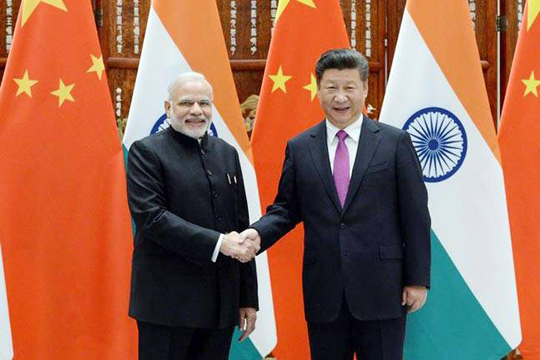Beijing/New Delhi, Jun 10: Amid strife in bilateral ties with China, PM Narendra Modi met Chinese President Xi Jinping on Friday with the Indian side describing the discussions as "cordial and positive" and noting that the two leaders agreed on the importance of working together.

Modi is understood to have thanked Xi for India's accession to the Shanghai Cooperation Organisation. "Both leaders noted that in a multi-polar world, and at a time of global uncertainty, India-China relations are a factor of stability, and it is important for both countries to work together," sources said.
According to agency reports, the PM said that the two nations should respect one another's "core concerns" and Xi said sensitive issues that impede bilateral ties should be addressed. Xi called for both sides to "properly address sensitive and major issues", the Chinese foreign ministry said.
The two leaders met in the Kazakh capital Astana on the sidelines of the SCO summit.
The meeting seemed to focus on commonalities despite differences over the China-Pakistan Economic Corridor, India's NSG membership and Beijing stonewalling sanctions on Maulana Masood Azhar.
The meeting also came after US President Donald Trump blamed India and China for an "unfair climate deal" while pulling out of the Paris agreement "There was an understanding that where we have differences, it is important that differences should not become disputes," foreign secretary S Jaishankar told reporters, describing the meeting as "cordial" and "very positive".
It was expected Modi would bring up India's positions on contentious issues but the meeting seemed to have been less dominated by issues such as NSG as was the case when the group was to consider the Indian application. The meeting saw a discussion on issues like trade, investment, connectivity and cultural exchange.
This was the first meeting between the two leaders after India kept away from the high-profile Belt and Road (OBOR) Forum held in Beijing last month in which 29 world leaders took part.
During his meeting with Xi, Modi said the two sides should tap their potential in cooperation, strengthen communication and coordination in international affairs, respect each other's core concerns and appropriately handle their disputes.
Asked whether the NSG, OBOR and Azhar issues were raised, Jaishankar did not give a direct reply and said the meeting was for taking a broad assessment of the relationship.





Comments
Add new comment